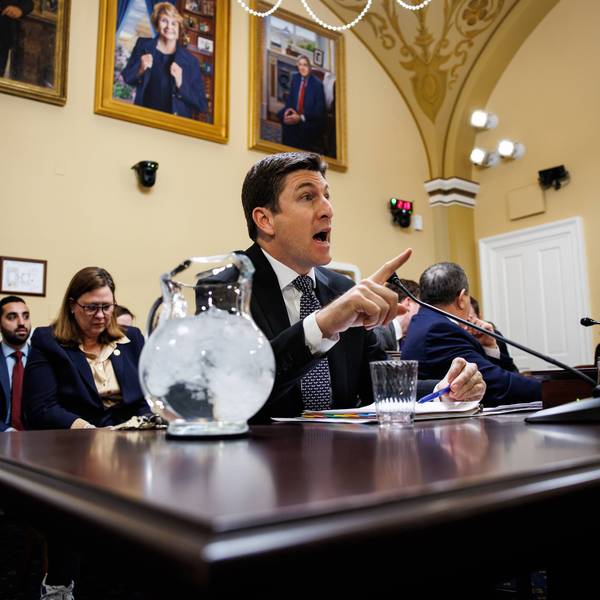
Texas voters could have less options for polling places if a new Republican state law is upheld. Democrats in the state have filed suit to strike it down. (Photo: Barron Ludlum/Yahoo)
'A Stain on Our Democracy': Texas Democrats File Suit to Stop GOP Voter Suppression Efforts
"We need to fight back in the courts and at the ballot box."
Democrats filed suit Wednesday in Texas to stop a Republican law that would curtail mobile voting sites in the state, claiming that the legislation is aimed at suppressing the vote and keeping Texas firmly in the hands of the GOP.
In a statement, Texas Democratic Party Chair Gilberto Hinojosa said that the Republican law is a stopgap attempt at delaying the inevitable demographic changes in Texas that could turn control of the state to Democrats.
"Texas Republicans ending mobile voting is their latest attempt to curb the Democratic rise in the state and steal an election from the rising Texas electorate," said Hinojosa "Republicans know Texas is changing, that's why they're trying to change the rules to make it harder for college students, seniors, the disability community, rural Texans, and survivors of natural disasters to cast their ballots."
The suit (pdf), which was filed by the Texas Democratic Party, the Democratic Senatorial Campaign Committee (DSCC), and the Democratic Congressional Campaign Committee (DCCC), targets HB 1888, which effectively bans temporary voting sites, a change to Texas law that would make voting more difficult for marginalized communities.
According to The Texas Tribune:
The use of temporary early voting sites dates back more than a decade in some parts of the state. Counties used them to reach smaller, more rural communities or to bring early voting to various college campuses within a county. Others relied on mobile voting sites to provide a window of early voting at hospitals or government buildings that couldn't host a permanent site or at senior living facilities where residents face increased mobility issues.
"We need to fight back in the courts and at the ballot box," said Mike Siegel, a Democratic candidate for Congress in Texas' 10th District. "Voter suppression is a stain on our democracy."
Sen. Catherine Cortez Masto (D-Nev.) and Rep. Cheri Bustos (D-Ill.), leaders of the DSCC and DCCC, respectively, both referred to the turnout in Texas during the 2018 midterms as the likely reason for the Republican law.
"The gains Texas made in boosting turnout prove that when we remove obstacles to voting, more people cast their ballots--and that's a good thing," said Masto.
Hinojosa said that the lawsuit will hopefully help more people to cast their votes.
"Democracy thrives when everyone participates," said Hinojosa.
An Urgent Message From Our Co-Founder
Dear Common Dreams reader, The U.S. is on a fast track to authoritarianism like nothing I've ever seen. Meanwhile, corporate news outlets are utterly capitulating to Trump, twisting their coverage to avoid drawing his ire while lining up to stuff cash in his pockets. That's why I believe that Common Dreams is doing the best and most consequential reporting that we've ever done. Our small but mighty team is a progressive reporting powerhouse, covering the news every day that the corporate media never will. Our mission has always been simple: To inform. To inspire. And to ignite change for the common good. Now here's the key piece that I want all our readers to understand: None of this would be possible without your financial support. That's not just some fundraising cliche. It's the absolute and literal truth. We don't accept corporate advertising and never will. We don't have a paywall because we don't think people should be blocked from critical news based on their ability to pay. Everything we do is funded by the donations of readers like you. Will you donate now to help power the nonprofit, independent reporting of Common Dreams? Thank you for being a vital member of our community. Together, we can keep independent journalism alive when it’s needed most. - Craig Brown, Co-founder |
Democrats filed suit Wednesday in Texas to stop a Republican law that would curtail mobile voting sites in the state, claiming that the legislation is aimed at suppressing the vote and keeping Texas firmly in the hands of the GOP.
In a statement, Texas Democratic Party Chair Gilberto Hinojosa said that the Republican law is a stopgap attempt at delaying the inevitable demographic changes in Texas that could turn control of the state to Democrats.
"Texas Republicans ending mobile voting is their latest attempt to curb the Democratic rise in the state and steal an election from the rising Texas electorate," said Hinojosa "Republicans know Texas is changing, that's why they're trying to change the rules to make it harder for college students, seniors, the disability community, rural Texans, and survivors of natural disasters to cast their ballots."
The suit (pdf), which was filed by the Texas Democratic Party, the Democratic Senatorial Campaign Committee (DSCC), and the Democratic Congressional Campaign Committee (DCCC), targets HB 1888, which effectively bans temporary voting sites, a change to Texas law that would make voting more difficult for marginalized communities.
According to The Texas Tribune:
The use of temporary early voting sites dates back more than a decade in some parts of the state. Counties used them to reach smaller, more rural communities or to bring early voting to various college campuses within a county. Others relied on mobile voting sites to provide a window of early voting at hospitals or government buildings that couldn't host a permanent site or at senior living facilities where residents face increased mobility issues.
"We need to fight back in the courts and at the ballot box," said Mike Siegel, a Democratic candidate for Congress in Texas' 10th District. "Voter suppression is a stain on our democracy."
Sen. Catherine Cortez Masto (D-Nev.) and Rep. Cheri Bustos (D-Ill.), leaders of the DSCC and DCCC, respectively, both referred to the turnout in Texas during the 2018 midterms as the likely reason for the Republican law.
"The gains Texas made in boosting turnout prove that when we remove obstacles to voting, more people cast their ballots--and that's a good thing," said Masto.
Hinojosa said that the lawsuit will hopefully help more people to cast their votes.
"Democracy thrives when everyone participates," said Hinojosa.
Democrats filed suit Wednesday in Texas to stop a Republican law that would curtail mobile voting sites in the state, claiming that the legislation is aimed at suppressing the vote and keeping Texas firmly in the hands of the GOP.
In a statement, Texas Democratic Party Chair Gilberto Hinojosa said that the Republican law is a stopgap attempt at delaying the inevitable demographic changes in Texas that could turn control of the state to Democrats.
"Texas Republicans ending mobile voting is their latest attempt to curb the Democratic rise in the state and steal an election from the rising Texas electorate," said Hinojosa "Republicans know Texas is changing, that's why they're trying to change the rules to make it harder for college students, seniors, the disability community, rural Texans, and survivors of natural disasters to cast their ballots."
The suit (pdf), which was filed by the Texas Democratic Party, the Democratic Senatorial Campaign Committee (DSCC), and the Democratic Congressional Campaign Committee (DCCC), targets HB 1888, which effectively bans temporary voting sites, a change to Texas law that would make voting more difficult for marginalized communities.
According to The Texas Tribune:
The use of temporary early voting sites dates back more than a decade in some parts of the state. Counties used them to reach smaller, more rural communities or to bring early voting to various college campuses within a county. Others relied on mobile voting sites to provide a window of early voting at hospitals or government buildings that couldn't host a permanent site or at senior living facilities where residents face increased mobility issues.
"We need to fight back in the courts and at the ballot box," said Mike Siegel, a Democratic candidate for Congress in Texas' 10th District. "Voter suppression is a stain on our democracy."
Sen. Catherine Cortez Masto (D-Nev.) and Rep. Cheri Bustos (D-Ill.), leaders of the DSCC and DCCC, respectively, both referred to the turnout in Texas during the 2018 midterms as the likely reason for the Republican law.
"The gains Texas made in boosting turnout prove that when we remove obstacles to voting, more people cast their ballots--and that's a good thing," said Masto.
Hinojosa said that the lawsuit will hopefully help more people to cast their votes.
"Democracy thrives when everyone participates," said Hinojosa.

